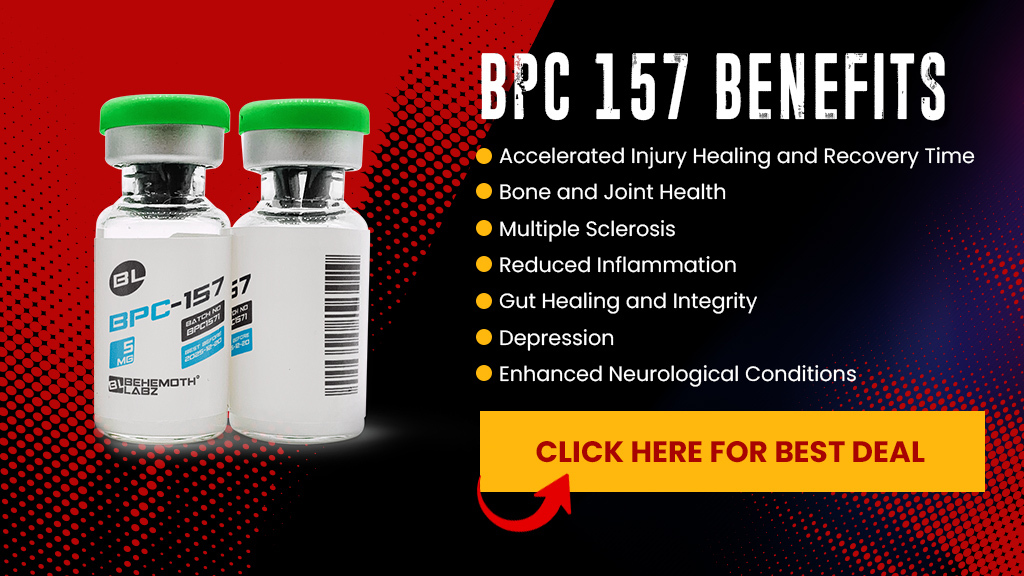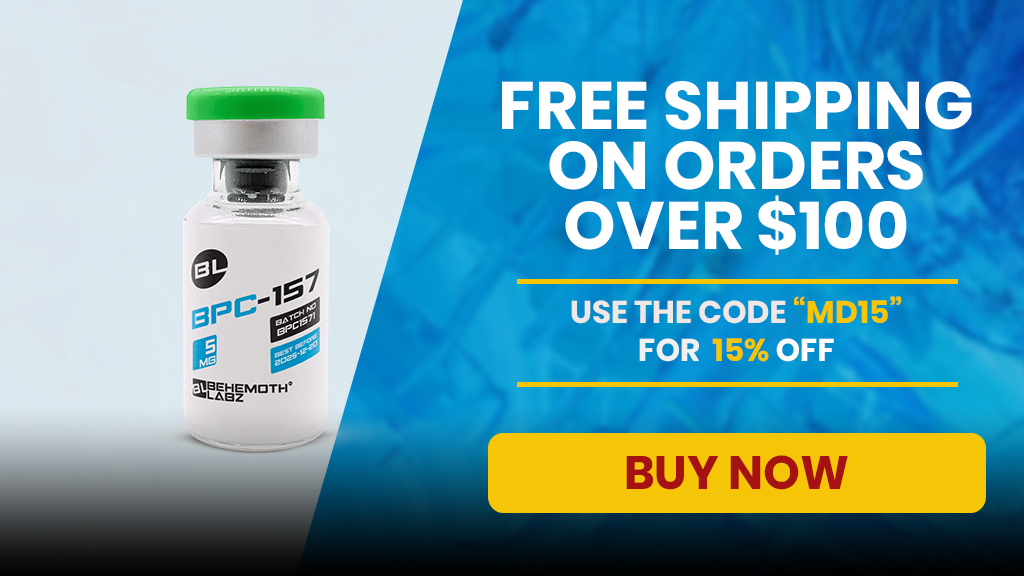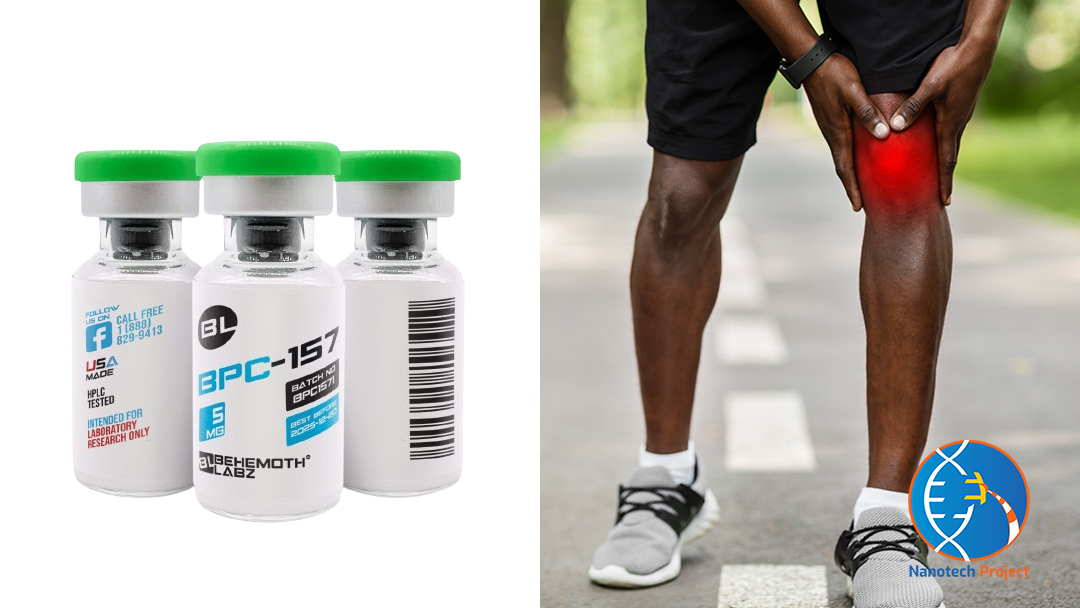Introduction

BPC 157 is an emerging peptide therapy that is garnering attention from researchers and health enthusiasts for its potential to accelerate healing throughout the human body. This 15-amino acid body protection compound is similar to a sequence found naturally in human gastric juice and shows promise in studies for speeding recovery in various other tissues when administered externally.
Early research conducted on rodents and cells has demonstrated that BPC 157 may promote healing in tendons, joints, nerves, gut health, and skin. Scientists are also investigating its effects on the brain gut axis, growth hormone levels, blood pressure, and brain inflammation. These studies suggest it may improve immune system function and overall wellness.
However, larger human trials are still needed to validate BPC 157’s efficacy and safety profile before peptide treatments like this enter mainstream use. More research is essential to understand if results seen in rodents also apply to most patients regarding wound repair and reduced inflammation in conditions like leaky gut, inflammatory bowel disease, and traumatic brain injury.
We await further clinical data to determine the realistic benefits and risks to develop an appropriate treatment plan involving this compound along with regular exercise.
Product Information
BPC 157 peptide has been shown to support the healing process in both animal and human trials. This body-protective compound is being explored for its effects on overall health and well-being. BPC 157 peptide treatment may assist digestive health by protecting the stomach lining and reducing ulcers. Some research also suggests benefits for joint health from this peptide, with potential effects on injury recovery and arthritis.
There are currently no known major health risks from using pure BPC 157 short-term, though long-term safety is still being studied. In athletic performance contexts, BPC 157 shows early promise for quicker muscle, tendon, and ligament healing when injured. Some bodybuilders also use it to protect joint health when lifting very heavy weights. Additionally, studies in rats indicate this peptide may influence fat burning due to its effects on blood vessels and gut healing.
More research is still needed, but BPC 157 offers a promising new peptide treatment to support healing processes and multiple aspects of health. Consult your doctor before starting any new supplement, especially research compounds like BPC 157.
Image Source: PubChem
How Does It Work?
As a pentadecapeptide naturally produced in human gastric juices, BPC 157 is composed of 15 amino acids arranged in a sequence similar to a protein found in the gastrointestinal tract where it contributes to rapid healing and tissue repair. Though the full mechanisms are still being elucidated, both animal and early human studies show BPC 157 administered via injection or nasal spray binds to receptors in injured areas leading to the activation of signaling pathways that accelerate wound closure, counter inflammation, and protect blood vessels to increase blood flow.
Unlike many other peptides, BPC 157 exhibits a systemic effect, able to travel through the blood to exert protective and reparative impacts on various tissues like the central nervous system, muscles, connective tissues, and injured joints. Research indicates BPC 157 stimulates the release of nitrous oxide to induce vasodilation and endothelial growth factors like VEGF, enhances neurotransmitter function, recruits immune modulating cells, and may regulate pain responses.
Though larger-scale human clinical trials are certainly needed, the current scientific literature provides early evidence that properly dosed and cycled BPC 157 peptide therapy, whether through intramuscular injection or nasal administration, can accelerate recovery after injury, and surgery, heal leaky gut, combat inflammatory bowel diseases like Crohn’s and ulcerative colitis, and improve mood disorders.
However, few users report minimal benefits even after a few weeks while the long-term impacts of this synthetic peptide on human organ systems have yet to be fully characterized.
BPC 157 Peptide: Potential Benefits

Accelerated Injury Healing and Recovery Time
Studies show that the peptide BPC 157 can dramatically accelerate the healing of injuries and surgical recovery across diverse tissue types in animal models. In cell culture experiments, BPC 157 strongly augmented the regeneration effects of growth hormone on tendon cells even at very low concentrations. BPC 157’s enhancing impact on tendon-building cells persisted for at least 3 days, demonstrating stability in biological systems. [R]
While laboratory studies cannot fully replicate real-world complexity, they speculate BPC 157 may speed healing by interacting with multiple cell types mobilized when injuries occur. More animal and human testing is still required to definitively characterize how BPC 157 facilitates quicker tissue repair and confirm if optimizing growth factor signaling plays a role based on these early cell culture findings. [R]
Overall, this peptide demonstrates clear promise to markedly improve healing outcomes, but additional research is imperative to elucidate its mechanisms of action and translate benefits observed in the lab to patient bedsides. By driving accelerated injury recovery, BPC 157 could one day meaningfully improve clinical outcomes and patient quality of life following surgery, wounds, or sports trauma once efficacy is established in human trials. [R]
Bone and Joint Health
Scientists have studied how BPC 157 affects tendon cells grown in a lab dish. The compound appears to help these tendon cells grow faster and spread out more compared to cells not exposed to BPC 157. It also seems to increase the tendon cells’ production of proteins that are important for cell growth and movement. [R]
Additionally, BPC 157 helps tendon cells better resist oxidative damage from compounds like hydrogen peroxide. Oxidative damage is thought to play a role in many injuries and chronic diseases. [R]
Other promising results come from animal studies. Applying BPC 157 to a collagen sponge during rat tendon surgery boosted collagen reformation. This helps repair the injury. Researchers also gave BPC 157 injections to rats with torn Achilles heels. The rats’ injuries appeared to heal faster based on smaller wound size and depth compared to rats not given the injections. [R]
These early LAB and animal findings suggest BPC 157 can reduce recovery time after a sports injury, joint sprain, or tendon tear. [R]
You might be interested in our other articles.
Multiple Sclerosis
Researchers study a compound called cuprizone to mimic some of the brain damage seen in multiple sclerosis. When rats take cuprizone, it reliably causes brain lesions and clinical problems similar to MS. Scientists used this rat model to explore whether BPC 157 might protect the brain. [R]
They administered BPC 157 to rodents alongside cuprizone doses. One group received it in their drinking water over 4 days. Another group got single doses directly into their stomachs on the last day. Rats taking BPC 157 exhibited less brain damage and fewer clinical abnormalities from the cuprizone compared to rodents not given BPC 157. [R]
These rat studies act as preliminary evidence that BPC 157 may shield the central nervous system from some harm caused by MS. The compound seems to alleviate certain brain lesions and symptoms induced by an MS-like condition in rodents. [R]
Reduced Inflammation
A growing body of evidence demonstrates that the peptide BPC 157 exerts potent anti-inflammatory effects, likely related to its protective capacity on the endothelium. Recent research revealed that in a rat model of periodontitis, those administered systemic BPC 157 injections displayed marked decreases in inflammation biomarkers compared to untreated controls. [R]
Investigators concluded that when given systemically, BPC 157 does not appear to impact healthy gum tissue blood flow. However, in rats with established gum inflammation and disease, regular BPC 157 administration substantially reduced tissue damage and inflammation. These initial results powerfully suggest BPC 157 holds promise as a novel therapeutic agent to prevent or improve gum disease. Additional testing remains imperative to confirm if robust anti-inflammatory benefits also manifest in humans with gum disease and elucidate the long-term impacts of treatment. [R]
By potently suppressing inflammation, BPC 157 could one day meaningfully improve outcomes for those suffering from gum disease or other inflammatory conditions once human efficacy and safety are fully characterized in clinical trials. The accumulating data demonstrate BPC 157 strongly calms inflammatory pathways across models and deserves investment into translational studies for clinical benefit. [R]
In the future, this peptide may provide patients and practitioners with an entirely new class of highly effective anti-inflammatory agents to combat gum disease and more. [R]
Gut Healing and Integrity
A growing body of research reveals the peptide BPC 157 exerts profound healing effects and protects gastrointestinal integrity across models of injury and disease. Multiple studies employing inflammatory bowel disease models have demonstrated that systemic or oral BPC 157 administration can potently alleviate intestinal inflammation and lesions. [R]
BPC 157 is also shown to rescue NSAID-induced gastrointestinal damage, holding immense promise for healing benefits in human conditions involving ulcers, leaky gut syndrome, and related disorders, though larger-scale clinical trials remain necessary. [R]
Excitingly, BPC 157 promotes powerful cytoprotective effects extending beyond the gut alone – evidence also indicates it can counteract the harmful gastrointestinal, hepatic, and neurological side effects provoked by chronic NSAID painkiller use, such as aspirin. Specifically, BPC 157 appears to fortify the stomach lining, boost injury healing in the stomach, intestines, liver, and brain, as well as neutralize aspirin’s effects of extended bleeding times and thrombocytopenia. [R]
The breadth of BPC 157’s protective capacity points to its potential as a novel antidote to mitigate NSAID-mediated toxicity. Moreover, whereas aspirin demands careful dosing to limit side effects, microgram amounts of BPC 157 may elicit protective benefits against aspirin toxicity while remaining very safe even at high animal doses. [R]
Altogether, the accumulating preclinical evidence underscores BPC 157’s exceptional therapeutic potential to heal and reinforce gut barrier integrity compromised by ulcers, chronic inflammation, painkiller side effects, and more. If clinical trials successfully translate these benefits seen from rodents to humans, BPC 157 could transform patient outcomes across gastrointestinal disorders and radically improve patient safety with long-term NSAID use. BPC 157 warrants accelerated research as a first-in-class peptide therapy to heal and bolster gut integrity. [R]
Depression
To screen for antidepressant effects, researchers utilize “behavioral despair” tests like Porsolt’s test. In this assessment, they place rats in containers of water and measure how long the animals persist in trying to escape. Effective antidepressants will make them swim for longer before becoming immobile or giving up. [R]
Studies subjected female rats to Porsolt’s forced swim analyses after administering BPC 157 injections. At doses of 10 ng/kg and 10 μg/kg, BPC 157 performed just as well as imipramine and nialamide – medications commonly used to treat depression. The rats given any of these compounds persisted in swimming and struggled for longer than rats not administered an antidepressant substance. [R]
In another experiment using rats exposed to chronic unpredictable stress, BPC 157 injections again worked similarly to a 30 mg dose of imipramine in helping the rats cope. [R]
Rodent studies show BPC 157 can mimic established antidepressants in tests designed to model human depression. While human clinical trials are still needed, these animal experiments demonstrate it has potential as an antidepressant support compound. The early data shows BPC 157 may help restore motivation and “behavioral activation” suppressed by depression or chronic stress. [R]
Enhanced Neurological Conditions
An accumulating body of research reveals the peptide BPC 157 elicits profound, beneficial impacts on neurological health across disease models. Multiple studies consistently demonstrate systemic BPC 157 administration can improve outcomes in animal models of stroke, schizophrenia, and spinal cord injury. Indeed, BPC 157 has shown effectiveness in disease models spanning the brain, gut, and beyond – evidence that its benefits extend far beyond specific research contexts. [R]
BPC 157 has exhibited an exceptional safety profile even at high doses in animals. Its mechanisms of action involve modulation of key neurotransmitters, including dopamine, glutamate, and nitric oxide signaling, underscoring its neurological therapeutic potential. Together, these data strongly indicate BPC 157 could successfully treat complex neurological conditions. [R]
Additional research is still imperative to elucidate the intricate central and peripheral pathways through which BPC 157 elicits neurological benefits. It likely interacts with most, if not all neuronal circuitry throughout the nervous system directly or indirectly. Some evidence reveals that systemically delivered BPC 157 can cross the blood-brain barrier through distinctive regions to exert central effects. Thus, BPC 157 appears to act along the gut-brain axis regardless of whether this action is direct or indirect. [R]
This unique peptide shows immense promise to heal damaged nervous system wiring and function. However further research must continue elucidating the precise mechanisms through which BPC 157 drives neurological enhancements. Ongoing and future investigations will shed light on how BPC 157 confers wide-ranging brain and spinal cord benefits. If clinical trials confirm preclinical findings, BPC 157 could give hope to millions suffering from neurological illness worldwide. [R]
Other Protective Effects
Cytoprotection refers to the ability of an agent to protect cells from damage or harmful stimuli. Based on numerous research studies, the peptide compound BPC 157 demonstrates potent cytoprotective effects in different tissues and organ systems. [R]
Specifically, BPC 157 has been shown to protect gastrointestinal cells from injury caused by alcohol, NSAIDs, chemotherapy drugs, and other noxious agents. Evidence indicates BPC 157 can also shield liver cells from toxins, preserve brain cell integrity after traumatic injury, safeguard blood vessel cells exposed to high pressure, and keep heart muscle cells intact when deprived of oxygen. [R]
Beyond cellular protection, research finds BPC 157 can accelerate the healing of wounds and ulcers, counteract leaky gut syndrome, resolve inflammation, and promote the repair of injured tendons, ligaments, and bones. These healing effects likely relate to BPC 157’s ability to stimulate growth factor signaling, angiogenesis (new blood vessel formation), and cell migration/proliferation at sites of tissue damage. [R]
In essence, BPC 157 rescues damaged cells and kickstart the regenerative process across body tissues. Its exceptional safety profile with no noted toxicity makes BPC 157 an exciting therapy to potentially mitigate disease complications involving cellular destruction. [R]
If further studies in humans validate early research, BPC 157 could fill a crucial gap as an integrative cytoprotective agent with both preventative and healing properties. This would massively advance the practical application and real-world outcomes of cytoprotection principles outlined decades ago yet rarely achieved to their full theoretical potential. Hence the significance of elucidating BPC 157’s mechanisms and clinical effects as a broadly effective, non-toxic cytoprotectant. [R]
Side Effects

As a relatively new peptide compound, the long-term safety profile of BPC 157 in humans is not yet fully characterized. However, a few potential side effects have been reported in the existing medical literature and by users:
Gastrointestinal Symptoms
Since BPC 157 is closely associated with the modulation of gastric juices and the GI tract, some users report mild symptoms like nausea, diarrhea, cramping, or loss of appetite, especially when administered via injection. These effects appear to be transient but should be monitored.
Hormonal Changes
A few rat studies note changes in levels of certain hormones like estrogen, cortisol, progesterone, and testosterone among animals given high doses of BPC 157 daily. The impacts of this on humans are unclear but periodic hormone level screening may be prudent.
Impacts on Other Medications
Little formal data exists on negative interactions but anecdotes from peptide users indicate BPC 157 may potentially interfere with blood thinners and certain heart medications. Anyone on regular prescriptions should consult their doctor before beginning treatment.
Allergic Reactions
As with exposure to any new compound, an allergic response is possible and has been noted by a small percentage of BPC 157 users. Rashes, itching, and shortness of breath necessitate immediate medical attention if they occur.
While promising, until large-scale human trials are concluded, all individuals engaging in BPC 157 therapy should remain cognizant that risks may emerge regarding organ dysfunction, receptor downregulation, autoimmunity, and long-term safety given our incomplete knowledge thus far. Careful physician monitoring is advised.
BPC 157 Peptide: Is It Legal?
The legality surrounding BPC 157, like many other peptides, falls into a gray area. This pentadecapeptide shows promise in accelerating tissue repair and recovery time from injuries or surgery. Some research indicates it may also provide benefits for intestinal conditions like Crohn’s disease and ulcerative colitis when administered in powder form or through nasal spray. However, evidence on BPC 157 comes predominantly from animal studies, with most human trials still ongoing.
While the peptide does not appear to be an outright banned substance, it is also not an FDA-approved drug that can be legally sold for human consumption and treatment plans. BPC 157 rather falls under the classification of a synthetic research compound. Patients technically can legally buy and use it, but solely for personal research purposes, not for medical treatment, weight loss, organ damage repair, or body performance enhancement – although these attract many people to peptide therapy.
The lack of strong clinical evidence, regulation, provider oversight, and long-term safety profiling means potential peptide users should carefully weigh risks versus possible healing benefits. With animal research showing faster recovery, reduced inflammation, and accelerated wound healing, BPC 157 holds promise. But considerably more research and eventual clinical approvals are still needed to categorize BPC 157 as a mainstream legal treatment rather than an experimental compound requiring caution. Consultation with one’s doctor is advised to navigate the loosely regulated landscape of peptide therapies.
Suggested Dose
Since most studies inject BPC 157, there is limited dose guidance for oral supplementation in humans. However, we can extrapolate tentative amounts from effective oral doses given to rats.
Researchers found benefits in rodents orally administered 10 μg of BPC 157 per kg of body weight. Accounting for species differences in pharmacokinetics, they estimate an equivalent human dose to be around 1.6 μg per kg.
What does this mean for various weights?
For a 150-pound person, that roughly translates to 110 μg of oral BPC 157. At 200 pounds, the rat-comparable amount would be around 145 μg. And a 250-pound individual could consider a BPC 157 dose of 180 μg.
Where Can I Buy Online?
Since 2014, Behemoth Labz has established a reputation as a reliable and reputable source for research compounds. The company prides itself on offering the highest quality products backed by independent, third-party Certificates of Analysis verifying identification, purity, and concentration.
Behemoth Labz’s commitment to quality touches every part of the business, from same-day order processing to free shipping on orders over $100 as well as a satisfaction guarantee.
The team at Behemoth Labz understands the importance researchers place on accessing the best compounds for their work. Dedicated to providing exceptional customer service, Behemoth Labz ensures its customers can obtain the substances needed to conduct groundbreaking research.
Additionally, Behemoth Labz offers international shipping, with the team devoted to getting orders delivered wherever in the world customers are located. By providing researchers worldwide access to quality compounds and support, Behemoth Labz aims to advance scientific understanding of the mechanisms and potential therapeutic applications of these substances across various conditions.

Conclusion
In conclusion, the evidence on BPC 157 peptide is promising but early. As a body protective compound naturally produced in human gastric juice, this peptide assists healing processes throughout the GI tract. BPC 157 speeds wound healing, limits gastric lesions, and may provide benefits for inflammatory bowel diseases like Crohn’s and ulcerative colitis. It demonstrates a protective effect on various tissues like the brain, joints, muscles, and nervous system. Benefits like regulating blood flow and reduced inflammation could improve injuries, burn recovery, traumatic brain injury, antidepressant effect, and overall health and potentially aid conditions involving organ damage or poor blood pressure regulation.
Peptide therapy using the synthetic version shows rapid healing results in animal studies. Human research is limited but suggests applications for accelerating recovery time after injury or surgery. For athletes, BPC 157 shows potential for faster return from muscle tears, damaged ligaments, and tendon tears, possibly improving joint health and aiding those lifting heavy weights. Others report nasal administration or intramuscular injections help lessen brain inflammation, digestive distress, or damaged gut permeability known as “leaky gut syndrome.”
In rats, BPC 157 also displayed antidepressant effects similar to commonly prescribed medications in forced swim despair tests. It increased struggling time and effort comparable to drugs like imipramine. Additionally, BPC 157 protected rat brains and alleviated clinical abnormalities induced by a multiple sclerosis-mimicking compound called cuprizone. These studies act as preliminary evidence that BPC 157 may also benefit mood disorders and central nervous system inflammation.
Despite promising benefits, more research on humans is needed to determine ideal dosing, timing, long-term impacts, and possible adverse effects or health risks. Consult a doctor before use, especially if combining BPC 157 with growth hormones, other peptides, or medications. While amino acid chains like BPC 157 assist many body processes, peptide treatments remain unregulated with questions about their safety over months or years. Carefully weigh any compound against risks before considering part of a daily health regimen. But this peptide shows intriguing promise warranting further investigation for healing acceleration, GI healing, or injury recovery.

